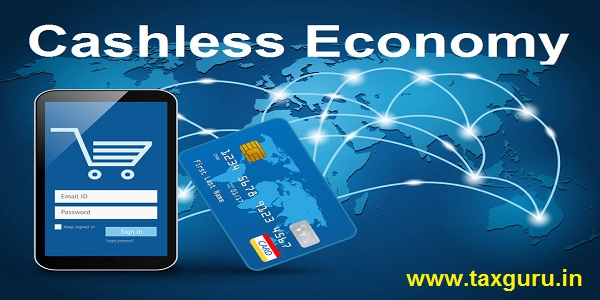INTRODUCTION:
We come across a common saying ‘Cash is King,’ however idle cash can never generate any interest income, therefore channelizing the idle money into digital mode shall generate income. The Cashless economy is a system where majority of transactions take place by modes other than cash. These modes may be credit cards, debit cards, wallets or digital modes where flow of cash is non-existent or is bare minimum. Cashless economy can be an effective gimmick to curb grey economy, terror-financing, corruption etc. It is considerable to note that cashless economy is a phenomenon that can be earmarked to bring a sea change in any country’s economy by transforming a cash-based economy into cashless economy through digital means. Cashless transactions have not only saved time by speeding up the transaction completion time but also saved lot of money by reducing costs associated with handling and accounting cash.
PROS OF CASHLESS ECONOMY:
1. INCREASED LIQUIDITY IN BANKING SYSTEM: Cashless transactions shall require people to keep all their cash with banks and hence liquidity in the banking system shall increase. Liquidity of banks is of vital significance as they are important to financial system. The proximate cause of a bank’s demise is mostly liquidity issue when they fail to meet their payment and settlement obligations.
2. INCREASE IN TAXNET: All the transactions shall be monitored and unearthed for individuals resulting in a check on tax evasion, increased tax revenue and wiping away black money from the economy. The existence of cashless economy shall definitely lead to development of a country by collecting surplus taxes and spending them towards the development of the economy.
3. CHECK ON NEFARIOUS OPERATIONS: Curtailing flow of cash in economy shall enable a check on criminal activities, money laundering, terrorist activities and other illegal activities as these are highly funded by cash. Predominantly use of digital modes shall help in keeping a tight rein on such activities, making them easily traceable and tracked.
4. MOBILITY OF FUNDS: Physically carrying of money will not be required therefore reducing the risk of theft. Just carrying mobile phones or cards will be required to carry out any transaction.
5. TRANSPARENCY OF TRANSACTIONS: Going cashless shall bring transparency and accountability in the hands of the senders and receivers, thereby going cashless shall eradicate corruption to some extent. Digital transactions are completely traceable and can be reconciled.
6. SAVINGS IN MAINTENANCE COST: Flow of cash in an economy involves printing of currency and allied expenses like maintenance cost in the form of storage cost, transportation cost of transporting currency to distant places and security cost. Also, another important cost involved is distribution cost of currency.
CONS OF CASHLESS ECONOMY:
1. SECURITY AND PRIVACY ISSUES: Cyber security is one of the major challenges for a cashless economy. Adequate security measures are required to safeguard online transactions against fraud. Cashless transactions give rise to security and privacy concerns as there is unending vulnerability to hacking and data breach. In cases where account is hacked, all the savings may be drained in a fraction of seconds. Activities such as phishing, duping money shall be easier in digital transactions.
2. LACK OF DIGITAL LITERACY: Everybody doesn’t have the knowledge required for doing digital transactions and therefore, it is very difficult to implement a cashless economy where the demographic profile is centered towards rural areas.
3. SCALABLE INFRASTRUCTURE: Digital infrastructure requires lucrative investment for overcoming power outages, incessant access of network connectivity, increased POS terminals. 100 percent uptime can never be guaranteed resulting in failed transactions, blocking of funds. A strong and reliable backup system is required for loss or malfunctioning or electronic payment system or devices.
4. RESISTANCE TO CHANGE: Regardless of how effectively people are made aware of benefits associated with cashless economy; there shall be a section of people who would resist change. For e.g. Elderly section of society are not as much tech savvy as compared to the younger blood.
5. INCREASED TRANSACTION COST THROUGH POS TERMINALS: Digital modes of payment involve transaction fee which is not incurred while carrying out cash-based transactions which may prove to be a hindrance to the cashless economy.
CONCLUSION:
While there are many pros of a cashless economy still the cons need to be addressed and straightened out. We can conclude that the idea of cashless economy can only be streamlined through sufficient and scalable infrastructure in place available everywhere including remote and rural areas at all times accompanied by adequate speed. The phenomenon of cashless economy can only be brought in a systematic manner by educating people through robust training programs by primarily focusing the rural people as to how to use the required technology and benefits of cashless transactions. Also, the laws and regulations should be precise and defined to prevent stealing of data and breach of security.







Well explained 👍✌
Very well written!!